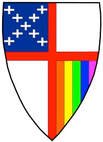|
These readings today are not just appropriate to the end of Lent and the new breath of Easter, but feel very specific to our community. Two funerals this past week for Gerry Knechtel and Gerry Haight and Terri Ghee passed away yesterday. It is a lot for our hearts to absorb. We may feel rung out. It is easy to feel parched and heavy like the valley of the dry bones.
Our reading from Ezekiel may sound uncomfortable with all of that rattling of bones. It can also be cathartic in that we may feel as exhausted and parched as that valley. And while as a child I found it quite terrifying, Ezekiel’s vision is actually empowering and it is hopeful. Ezekiel prophesied at a time when the people of Israel were in exile in Babylon. During the diaspora after the destruction of the Temple and Jerusalem in 586 B.C.E. the people were conquered, scattered and displaced. The people were lost. “They say, ‘Our bones are dried up, and our hope is lost; we are cut off completely.’” But the story is a hopeful message. The valley of the dry bones is the people of Israel. God essentially tells Ezekiel to give them hope. He says, tell them, I will raise them up and put the Spirit of life in them, and they shall live. It is about resurrection life… not the final resurrection but resurrection life that still comes to us from God after a tragedy, or death, or loss. There is rebuilding of places, and things, and hearts, but sometimes we have to go through the valley of dry bones, the grief, and letting go completely, before we can find the strength to rattle our bones off of the couch, out of the ditch, or from the valley we find ourselves in. The story of Lazarus is also about this process. It is unique in the miracle stories, in that there is so much spoken about what is happening before the miracle in that difficult and dry space. The Gospel takes us through the story of grief. We hear the questioning and the pain. Since we know how the story ends, we may forget to listen anew and hear the words, but “When Jesus arrived, he found that Lazarus had already been in the tomb four days.” Mary and Martha ask Jesus, Where were you? The community asks, couldn’t you have prevented this? Isn’t this what we ask of God at these times? There is weeping. Martha and Mary and their friends are weeping. Jesus is weeping. His humanity is on full display here in a way that is very moving. The Gospel is assuring us: We do not meet resurrection in this life or in the life to come without tears and grief. We often do not meet change without some form of grief. This morning our Prayers of the People will be a special litany that the Bishop has asked all our churches to participate in. It is an apology for slavery - specifically for the Diocese’s historic role as it benefited from slavery. Yesterday we had a service in the cathedral. I was unable to go down because of Gerry’s Haight’s burial yesterday. I watched most of it on FB. It was a moving service. I encourage you to go on the Cathedral’s website and if you can’t watch the service at least listen to Bishop Dietsche’s sermon. The Diocese has been working on anti racism for thirty years and reparations for twenty years. We’ve been working up to this service of apology for five years. This beautiful Diocese was built on slavery. Yesterday and today we stand here as the Body of Christ and as a voice for the Diocese. This Diocese, this Body of Christ includes individuals, and voices, and emotions of a multitude. While some of those emotions may not feel specific to you, they are specific to us if we recognize we are all united in Christ. Our collective body is rattling its bones to healing. And it is uncomfortable. Participating in a collective apology and a collective grief opens us up to the healing breath of God for the whole body. Ezekiel’s vision of the dry bones as the People of Jerusalem is communal. The divine breath of God infusing the whole community is the basis for a new community based in life and not death. In Romans, Paul too speaks to this new community of Christians being alive in the Spirit: to “set the mind on the Spirit is life and peace.” Both Ezekiel’s prophetic vision and the story of Lazarus are premonitions of the resurrection of Jesus into the Christ. As the Body of Christ, Paul reminds us: “If the Spirit of him who raised Jesus from the dead dwells in you, he who raised Christ from the dead will give life to your mortal bodies also through his Spirit that dwells in you.” Life and Peace and Joy are the promises of our hope and faith as Christians. While our mortal bodies may question and grieve, our Spirits are held in those promises. Resurrection is always meant for the entire community. That is the good news of the Gospel. Resurrection life is not meant for Jesus alone. It is not meant for ourselves and our loved ones. It is meant for the whole world: The basis of a new community: Life and Hope and Joy. As the Collect states today, Let us pray: Grant your people that among the swift and varied changes of the world, our hearts may surely there be fixed where true joys are to be found. Amen.
0 Comments
Leave a Reply. |
AuthorThe Rev. Heather K. Sisk Archives
July 2024
Categories |
We Would Love to Have You Visit Soon!
WE ARE ALL MADE IN THE IMAGE OF GOD |
Telephone845-635-2854
|
|
 RSS Feed
RSS Feed

